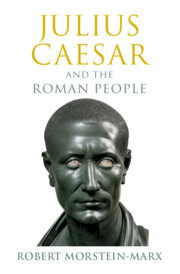Book contents
- Julius Caesar and the Roman People
- Julius Caesar and the Roman People
- Copyright page
- Dedication
- Contents
- Figures
- Acknowledgments
- Abbreviations
- Chapter 1 Introduction
- Chapter 2 The Early Caesar
- Chapter 3 Caesar’s “Entry into History”
- Chapter 4 Caesar’s First Consulship
- Chapter 5 Caesar in Gaul
- Chapter 6 No Return
- Chapter 7 Taking Sides
- Chapter 8 Caesar’s Leniency
- Chapter 9 En Route to the Parthian War
- Chapter 10 Conclusion
- Appendices
- Works Cited
- Select Index of Passages Cited
- General Index
Chapter 10 - Conclusion
Published online by Cambridge University Press: 05 August 2021
- Julius Caesar and the Roman People
- Julius Caesar and the Roman People
- Copyright page
- Dedication
- Contents
- Figures
- Acknowledgments
- Abbreviations
- Chapter 1 Introduction
- Chapter 2 The Early Caesar
- Chapter 3 Caesar’s “Entry into History”
- Chapter 4 Caesar’s First Consulship
- Chapter 5 Caesar in Gaul
- Chapter 6 No Return
- Chapter 7 Taking Sides
- Chapter 8 Caesar’s Leniency
- Chapter 9 En Route to the Parthian War
- Chapter 10 Conclusion
- Appendices
- Works Cited
- Select Index of Passages Cited
- General Index
Summary
Caesar was no aspiring autocrat seeking to realize the imperial future but a republican political leader whose success was based on a combination of patrician pedigree with a popular persona built on an extraordinary record of military achievement. He was no anti-senatorial, populist revolutionary but followed in the tracks of Roman heroes of the past such as the Scipios. His astonishing success hardened his enemies' determination to stop him, even at the price of forcing a civil war. His assassination on the eve of his departure for a great war of vengeance against Parthia precluded whatever plans for consolidation he may have had, but also propelled the violence of civil war into the next phase of what would become a decisively destructive cycle. If Gruen was correct to emphasize that civil war destroyed the Republic, not its preexisting institutional weaknesses, then human choices, especially those that brought about the Civil War, provide the most satisfactory explanation for the collapse of the Republic.
- Type
- Chapter
- Information
- Julius Caesar and the Roman People , pp. 580 - 615Publisher: Cambridge University PressPrint publication year: 2021

